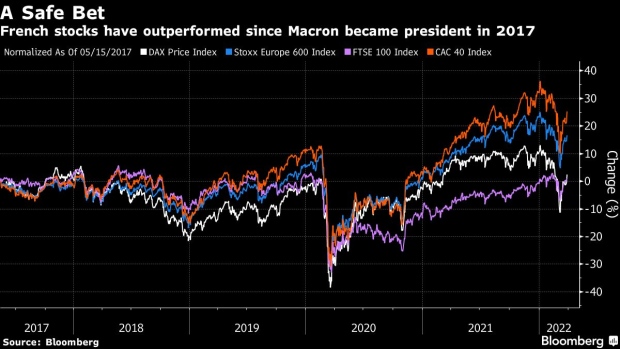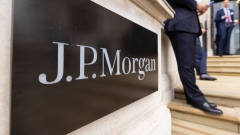Apr 2, 2022
A Stock Trader’s Guide to French Elections: Winners and Losers
, Bloomberg News

(Bloomberg) -- French stocks outperformed other European markets during Emmanuel Macron’s presidency, and investors are betting on further gains if he wins re-election this month.
Energy, construction and retail are among sectors likely to move depending on the outcome of the race. With inflation surging to record levels, the candidates are all focused on ways to boost household purchasing power.
A week before the first round, the 44-year-old president leads in the polls, which show he’s likely to face nationalist leader Marine Le Pen in the April 24 runoff. That would be a replay of 2017, though surveys show Macron is ahead by a narrower margin this time.
It’s clear investors would prefer the business-friendly Macron, said Alexandre Baradez, chief market analyst at IG France.
“It would give additional relief to markets after a tense start of the year,” Baradez said. “The euro would gain a bit versus the dollar and spreads would continue stabilizing. It wouldn’t be such smooth sailing with Le Pen.”
France’s Stunning Economic Rebound May Seal Macron’s Re-Election
Le Pen and the incumbent are among 12 candidates on the April 10 first-round ballot, with far-left candidate Jean-Luc Melenchon, far-right pundit Eric Zemmour and conservative Valerie Pecresse rounding out the top five in polls.
Here’s our guide to potential winners and losers in equity markets:
Energy
All the main candidates except Melenchon agree on the need for more nuclear power to bolster France’s energy independence. Macron proposed building as many as 14 new reactors and said some assets of power company Electricite de France SA should be nationalized. “The question of energy sovereignty has become crucial and nuclear investments will be supportive for EDF and other energy stocks post elections,” said IG France’s Baradez.
The flip side is that whoever wins may opt for additional freezes on consumer power tariffs in an effort to rein in rising prices and avoid a repeat of the Yellow Vest protests that rocked France early in Macron’s presidency. EDF has lost almost a third of its value since October after Macron forced the utility to sell more power at a steep discount to protect households from surging prices.
Melenchon, the far-left candidate, wants an exit from nuclear, would nationalize EDF and gas utility Engie SA and wants to abolish all the hikes to gas tariffs since 2017.
Macron has pledged massive growth in solar and offshore wind power alongside nuclear as part of the transition away from fossil fuels. Le Pen opposes wind farms, and wants them dismantled if she wins. Engie, Neoen SA and EDF are among companies that would be affected.
Luxury
Luxury emerged as a powerhouse sector for France under Macron and the domination of Dior owner LVMH is likely to last, in particular following the conglomerate’s purchase of the U.S. jeweler Tiffany & Co. last year. LVMH CEO Bernard Arnault leaned on the government during the Tiffany takeover battle and his daughter Delphine is close to Brigitte Macron, who is known to favor Louis Vuitton clothes. Macron created a stable business environment, cutting taxes for the wealthy and helping retain billionaires like Arnault, who had previously sought Belgian citizenship.
A Le Pen victory could mean “we start speaking of tariffs again, like with Trump,” said IG France’s Baradez. “This would lead to retaliation and hurt exporters, notably luxury. The psychological impact on luxury stocks would be immediate.”
LVMH, Gucci owner Kering SA and Hermes International have accounted for almost 60% of the CAC 40’s gain since Macron’s election. All three stocks are down by 11% or more this year.
‘Unstoppable’ Luxury Stocks Remind Some Investors of U.S. Tech
Food Retail
Investors expect grocer Carrefour SA to be acquired after the elections. Macron’s government blocked the company’s plan to sell itself to Canada’s Alimentation Couche-Tard Inc., saying the pandemic showed the need for major food distributors to remain under domestic ownership. Talks with another potential buyer, French rival Auchan, stalled last year.
The next French government is likely to favor a domestic solution as well, said Ben Kelly, an analyst at Louis Capital Markets. Macron also is proposing so-called food vouchers to help less affluent citizens suffering from inflation, and this could potentially benefit Carrefour and Casino Guichard-Perrachon SA, said Fabienne Caron, analyst at Kepler Cheuvreux.
Defense
All the main candidates pledge to boost defense spending in the aftermath of Russia’s invasion of Ukraine. Dassault Aviation SA, the maker of Rafale combat jets, Airbus SE, which produces military as well as commercial aircraft, and Thales SA, a provider of missile-guidance systems, all stand to benefit. Le Pen, whose past links to Vladimir Putin are doing little to dent support for her, said she would pull France out of NATO’s military command.
Banks and Insurers
BNP Paribas SA and Societe Generale SA are among lenders seen benefiting from the re-election of Macron, a former investment banker. “Macron is business friendly and banks would react well if he’s re-elected,” said John Plassard, a director at Mirabaud & Cie. A win by Le Pen or Zemmour probably would widen the spread between the yield on French and German government bonds, which would be “a clear negative” for French asset managers and insurance companies, said Stephane Monier, chief investment officer at Lombard Odier.
Construction, Transport
Construction companies Eiffage SA and Vinci SA would benefit from an increase in nuclear investments and broader energy transition and infrastructure spending, according to UBS Group AG. Vinci and Eiffage also operate highways, which both Le Pen and Melenchon have pledged to re-nationalize if elected. Melenchon also wants to abolish airline flights when train alternatives are less than four hours long, which would affect Air France-KLM.
France Pledges $2.2 Billion to Bolster Appeal for Tourists
Catering, Hotels
Hotel operators such as Accor SA and the caterers Elior SA and Sodexo SA would all benefit from a Macron victory, says Mirabaud’s Plassard. Caterers would face higher costs, which they might not be able to fully pass on, from Le Pen’s pledge that at least 80% of food products in cafeterias should come from France. Her plan to control immigration could hurt industries suffering from labor shortages, such as hospitality and construction, said IG France’s Baradez.
©2022 Bloomberg L.P.







